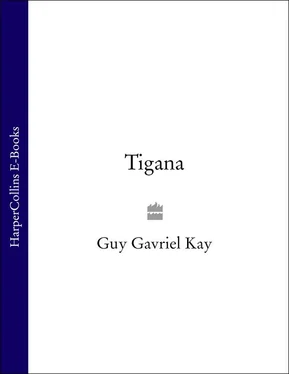1 ...8 9 10 12 13 14 ...41 He saw their clothing torn from them as they cried each other on to the hunt. Saw branches of mountain trees, of spiny, bristling shrubs, claw their garments away, saw them render themselves deliberately naked for greater speed to the chase, seizing blood-red berries of sonrai to intoxicate themselves against what they would do high above the icy waters of Casadel.
He saw the god turn at last, his huge dark eyes wild and knowing, both, as he stood at the chasm brink, a stag at bay at the deemed, decreed, perennial place of his ending. And Devin saw the women come upon him there, with their flying hair and blood flowing along their bodies and he saw Adaon bow his proud, glorious head to the doom of their rending hands and their teeth and their nails.
And there at the end of the chase Devin saw that the women’s mouths were open wide as they cried to each other in ecstasy or anguish, in unrestrained desire or madness or bitter grief, but in his dream there was no sound at all to those cries. Instead, piercing through the whole of that wild scene among cedar and cypress on the mountainside, the only thing Devin heard was the sound of Tregean shepherd pipes playing the tune of his own childhood fever, high and far away.
And at the end, at the very last, Devin saw that when the women came upon the god and caught him and closed about him at that high chasm over Casadel, his face when he turned to his rending was that of Alessan.
Chapter III
Even before the coming of cautious Alberico from overseas in Barbadior to rule in Astibar, the city that liked to call itself ‘The Thumb that Rules the Palm’ had been known for a certain degree of asceticism. In Astibar the mourning rites were never done in the presence of the dead as was the practice in the other eight provinces: such a procedure was regarded as excessive, too fevered an appeal to emotion.
They were to perform in the central courtyard of the Sandreni Palace, watched from chairs and benches placed around the courtyard, and from the loggias above, leading off the interior rooms on the two upper floors. In one of those rooms, marked by the appropriate hangings—grey-blue and black—lay the body of Sandre d’Astibar, coins over his eyes to pay the nameless doorman at the last portal of Morian, food in his hands and shoes on his feet, for no one living could know how long that final journey to the goddess was.
He would be brought down to the courtyard later, so that all those citizens of his city and its distrada who wished to do so—and who were willing to brave the recording eyes of the Barbadian mercenaries posted outside—could file past his bier and drop blue-silver leaves of the olive tree in the single crystal vase that stood on a plinth in the courtyard even now.
The ordinary citizens—weavers, artisans, shopkeepers, farmers, sailors, servants, lesser merchants—would enter the palace later. They could be heard outside now: gathered to hear the music of the old Duke’s mourning rites. The people drifting into the courtyard in the meantime were the most extraordinary collection of petty and high nobility, and of accumulated mercantile wealth that Devin had ever seen in one place.
Because of the Festival of Vines, all the lords of the Astibar distrada had come into town from their country estates. And being in town they could hardly not be present to see Sandre mourned—for all that many or most of them had bitterly hated him while he ruled, and the fathers or grandfathers of some had paid for poison or hired blades thirty years ago and more in the hope that these same rites might have taken place long since.
The two priests and Adaon’s priestess were already in their seats, seeming, in the manner of clergy everywhere, to be privy to a mystery that they collectively shielded from lesser mortals with the gravity of their repose.
Menico’s company waited in a small room off the courtyard that Tomasso had ordered set aside for their use. All the usual amenities were there, and some that were far from usual: Devin couldn’t remember seeing blue wine offered to performers before. An extravagant gesture, that. He wasn’t tempted though; it was too early and he was too much on edge. To calm himself he walked over to Eghano who was lazily drumming, as he always seemed to be, on a tabletop.
Eghano glanced up at him and smiled. ‘It’s just a performance,’ he said in his soft sibilant voice. ‘We do what we always do. We make music. We move on.’
Devin nodded, and forced a smile in return. His throat was dry though. He went to the side-tables, and one of the two hovering servants hastened to pour him water in a gold and crystal goblet worth more than everything Devin owned in the world. A moment later Menico signalled and they went out into the courtyard.
The dancers began it, backed by hidden strings and pipes. No voices. Not yet.
If Aldine and Nieri had burned love candles late last night it didn’t show—or if it did, only in the concentration and intensity of their twinned movements that morning.
Sometimes seeming to pull the music forward, sometimes following it, they looked—with their thin, whitened faces, their blue-grey tunics and the jet-black gloves that hid their palms—truly otherworldly. Which was as Menico had trained his dancers to be. Not inviting or alluring as some other troupes approached this dance of the rites, nor a merely graceful prelude to the real performance, as certain other companies conceived it. Menico’s dancers were guides, cold and compelling, towards the place of the dead and of mourning for the dead. Gradually, inexorably, the slow grave movements, the expressionless, almost inhuman faces imposed the silence that was proper on that restive, preening audience.
And in that silence the three singers and four musicians came forward and began the ‘Invocation’ to Eanna of the Lights who had made the world, the sun, the two moons and the scattered stars that were the diamonds of her diadem.
Rapt and attentive to what they were doing, using all the contrivances of professional skill to shape an apparent artlessness, the company of Menico di Ferraut carried the lords and ladies and the merchant princes of Astibar with them on a ruthlessly disciplined cresting of sorrow. In mourning Sandre, Duke of Astibar, they mourned—as was proper—the dying of all the Triad’s mortal children, brought through Morian’s portals to move on Adaon’s earth under Eanna’s lights for so short a time. So sweet and bitter and short a season of days.
Devin heard Catriana’s voice reaching upwards towards the high place where Alessan’s pipes seemed to be calling her, cold and precise and austere. He felt, even more than he heard, Menico and Eghano grounding them all with their deep line. He saw the two dancers— now statues in a frieze, now whirling as captives in the trap of time—and at the moment that was proper he let his own voice soar with the two syrenyae into the space that had been left for them to fill, in the middle range where mortals lived and died.
So Menico di Ferraut had shaped his approach to the seldom-performed Full Mourning Rites long ago, bringing forty years of art and a full, much-travelled life to the moment that this morning had become. Even as he began to sing, Devin’s heart swelled with pride and a genuine love for the rotund, unassuming leader who had guided them here and into what they were shaping.
They stopped, as planned, after the sixth stage, for their own sake and their listeners’. Tomasso had spoken with Menico beforehand, and the nobles’ progression past Sandre’s bier would now take place upstairs. After, the company would finish with the last three rites, ending on Devin’s ‘Lament’, and then the body would be brought down and the crowd outside admitted with their leaves for the crystal vase.
Читать дальше












